Star Trek: Discovery Writers Pick Their Favorite Classic Trek Episodes
Stream these legendary episodes as Star Trek: Discovery continues on CBS All Access.
Posted on Oct 17, 2017 | 04:00pm
For more than 50 years, Star Trek has inspired multiple generations of fans, including the creators of the CBS All Access original series Star Trek: Discovery.
STREAM: Full Episodes Of Star Trek: Discovery On CBS All Access
With the new show now underway, Star Trek: Discovery Executive Producers Alex Kurtzman, Akiva Goldsman, Gretchen J. Berg, and Aaron Harberts, as well as writers Ted Sullivan, Lisa Randolph, Jordon Nardino, Erika Lippoldt, Bo Yeon Kim, Kirsten Beyer, and Sean Cochran have revealed some of their absolute favorite classic Trek episodes—or "Trekisodes"—and what they mean to them as both fans and creators.
Scroll down to see the team's top picks!
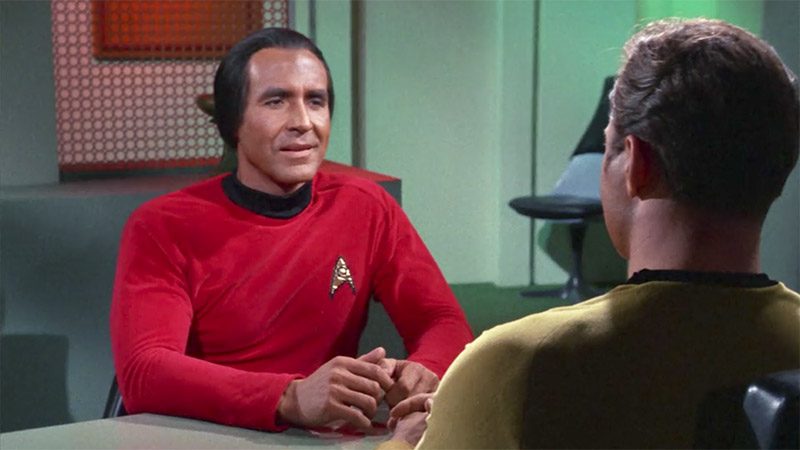
"Space Seed" (Star Trek)
Alex Kurtzman: A villain with a legitimately compelling reason "why" is rare currency and just about the hardest thing to accomplish. And so it began with Khan, whose motives are drawn by what's essentially a Spartacus story: Bred a slave, he rose against his less "superior" masters to declare his freedom—a freedom he conflates with totalitarianism, firmly landing him a prime place in the pantheon of all-time greatest badasses. Decades later, with [Star Trek II: The Wrath of Khan], the brilliant Nick Meyer built on Khan in what for me and many others became the best Trek movie of all time, which could never have existed if it weren't for this episode of TOS.
Stream "Space Seed" now.
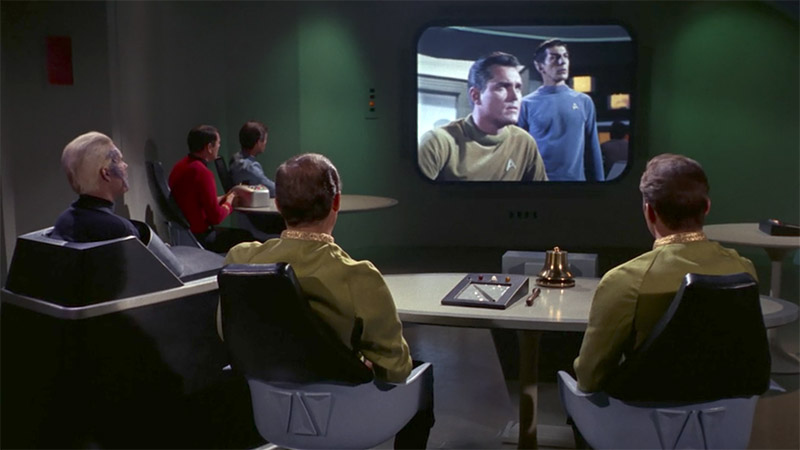
"The Menagerie - Parts 1 & 2" (Star Trek)
Akiva Goldsman: Sacrilegious as it sounds, I prefer this two-parter to "The Cage." It has almost all the benefits of the original—Jeffrey Hunter as Pike, a literally cool Majel Barrett as Number One, emotional Spock, excellent sci-fi, and awesome scope and scale—but all this is actually made better by its re-contextualization into the series proper. Spock's devotion to Pike years later, its juxtaposition to his relationship with Kirk, and its clever reintegration of the original material make for a deeper and more utopian Trek story. Bonus Elements: The only death penalty left on the books and a phaser cannon.
Stream "The Menagerie - Parts 1 & 2" now.
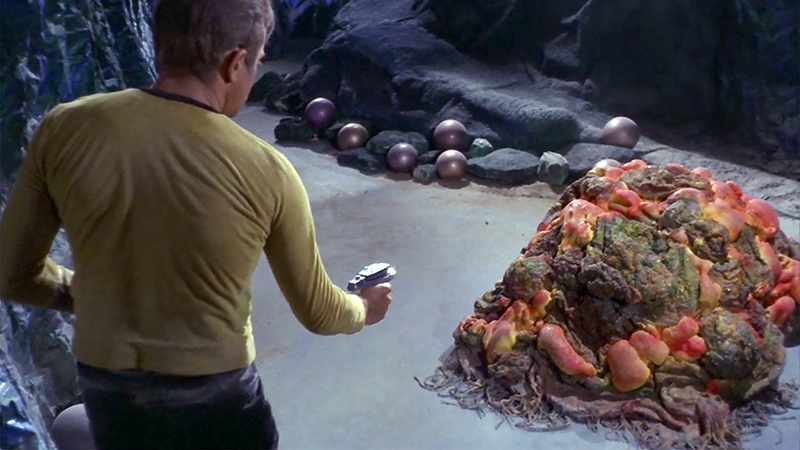
"The Devil in the Dark" (Star Trek)
Gretchen J. Berg: The first time I watched it I burst into tears. I was so affected by the Horta and the twist. The way that Spock is able to see the Horta and then communicate with it and find out that this monster might not be a monster after all is such a profound piece of storytelling.
Kirsten Beyer: The whole "the monster was actually a mother protecting her babies" thing made quite an impact on me as a kid watching Trek for the first time.
Stream "The Devil in the Dark" now.
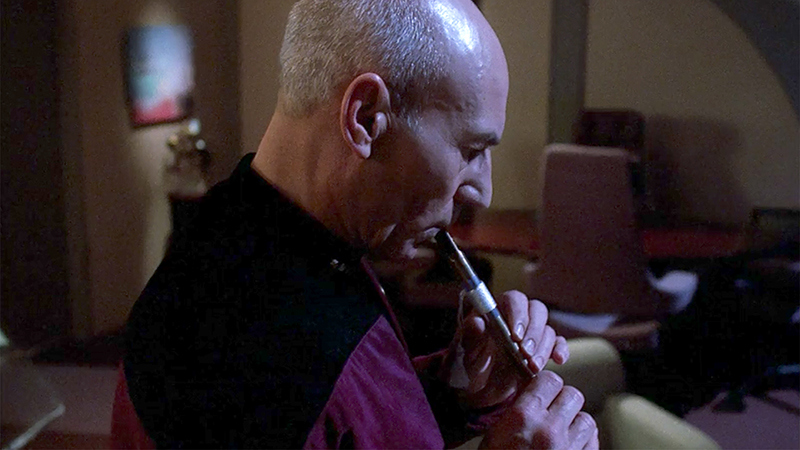
"The Inner Light" (Star Trek: The Next Generation)
Aaron Harberts: Patrick Stewart gives a stunning performance and it breaks the mold for traditional storytelling within Star Trek. It's bold and emotionally complex. It also had a lasting impact on Picard, which is an element of serialized storytelling that we're looking to build upon on our show.
Bo Yeon Kim: I was blown away by this beautiful (and gut-wrenching) first contact story that intricately weaves science fiction, mystery, and drama together into... well, a Ressikan flute solo. A masterclass in how to execute a high sci-fi concept via a grounded, emotional tale about family, life, and death.
Stream "The Inner Light" now.
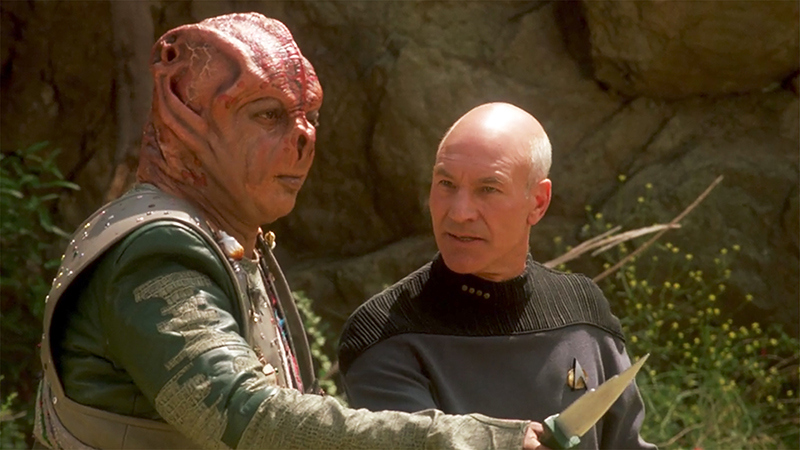
"Darmok" (Star Trek: The Next Generation)
Gretchen J. Berg: It's written by our own Joe Menosky. It's everything great about Star Trek. It's one of the best Prime Directive stories ever told. And it's about understanding "the other"—which is a lesson we can all re-learn these days. And something we have baked into the DNA of our show as well.
Ted Sullivan: Even before I had the honor of writing Star Trek: Discovery with Joe Menosky, I was in awe of his writing. This episode is one of the smartest episodes of science fiction ever created. It's a beautiful exploration of two cultures seeking to find common ground. To communicate. To grow. And that journey comes with great sacrifice. Patrick Stewart and Paul Winfield give jaw-dropping performances as they slowly move their two cultures toward mutual understanding.
This episode is compelling from start to finish, but does not rely on phaser shootouts or space battles. Instead, it does what Star Trek does best: it's about sharing ideas and expanding our understanding of each other.
Kirsten Beyer: The concept of basing a language on metaphor remains stunning to this day, and the simple story of these two beings trying to communicate is the essence of Trek.
Sean Cochran: Beyond the involvement of the brilliant Joe Menosky, who wrote it, and the legendary Paul Winfield, who turned in one of the all-time Trek performances, I love how this episode highlights the lengths to which we must sometimes go to find common understanding with those dissimilar to us. That tragedy and loss are often central to cultural breakthroughs is something often found throughout history but rarely emphasized.
Stream "Darmok" now.

"Unification - Parts 1 & 2" (Star Trek: The Next Generation)
Alex Kurtzman: I watched this two-parter a lot for inspiration when we were writing the 2009 [Star Trek movie]. It helped me understand how to return Spock to the fold with the meaning and coronation one would expect from the great Vulcan's homecoming, but also pointed us toward the potential for a scene between elder and younger Spock.
The inspiration came from the scene between Spock and Data, a Trekker's dream come true, and I can only imagine the challenge [Michael Piller and Rick Berman] felt in tackling it. They executed [their relationship] perfectly by echoing them as opposite sides of the same coin: an android who yearns to become more human, and a Vulcan who's spent his elder years suppressing his human side. (Maybe it's just how I read into it, but it always felt like the absence of Kirk's friendship in Spock's life played into that.)
A deeply emotional scene held in restraint, it's a portrait of two beings both fascinated and confused by their similarities and differences, and reaching for understanding. That sums up what Trek is all about and gives poignant double meaning to the title "Unification."
Stream "Unification - Parts 1 & 2" now.
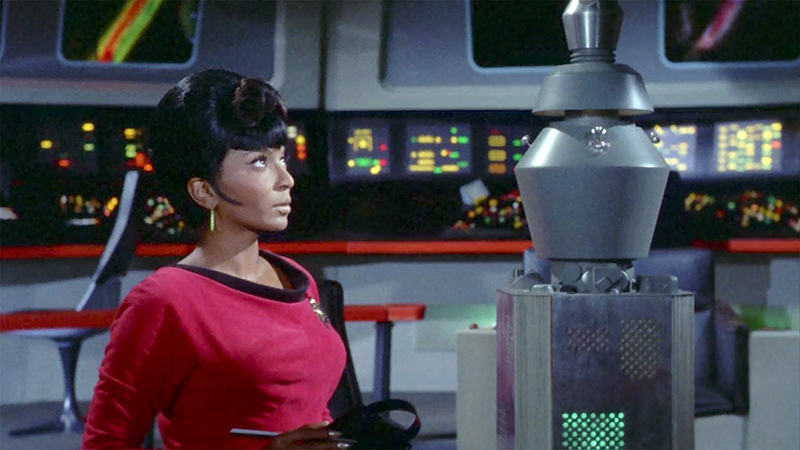
"The Changeling" (Star Trek)
Ted Sullivan: A cool metaphysical mystery that explores what life is and what consciousness means—classic Trek. But like "The Naked Time" and "Shore Leave," this episode also gives the supporting cast a chance to step into the spotlight. I love seeing more of Uhura's love for singing and hearing her speak Swahili (a terrific reminder that Trek could be something other than American-centric). I also really like seeing Uhura and Nurse Chapel bond as friends.
Stream "The Changeling" now.
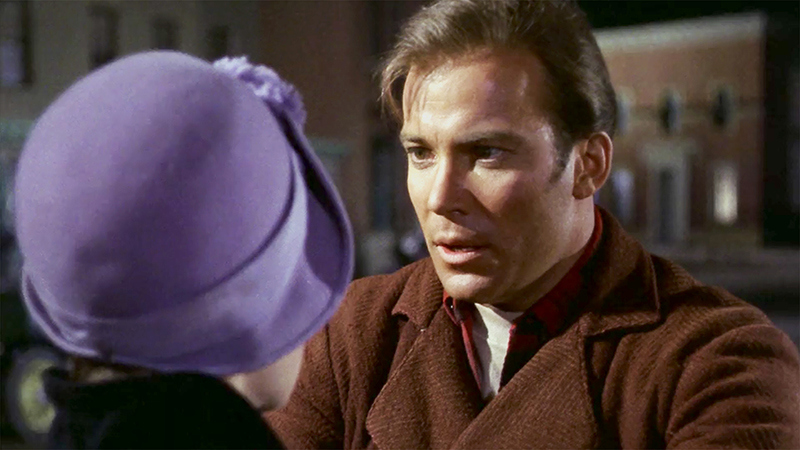
"The City on the Edge of Forever" (Star Trek)
Akiva Goldsman: So many people's favorite Trek episode, including mine. Brilliant Harlan Ellison screenplay, made better by Roddenberry and company. Thought provoking sci-fi, and strong period work. Some of my favorite Trek elements: a return to earth, Starfleet revealed to civilians, naturalistic acting—all wrapped up inside a profound emotional punch. If streaming were available then, Kirk's loss of Edith Keeler would have taken him seasons to get over. Crazed Dr. McCoy and self-critical Spock, awesome bonus elements.
Ted Sullivan: Probably the safest choice a fan could ever make, but for good reason. Harlan Ellison created a morality tale that was complex, emotionally rich, and profoundly enlightening. He used all the pieces on the Trek chessboard like a grandmaster.
It was the first episode I ever saw (way back in the Dark Ages of 1979). As a young boy, I was confused by what I was watching. It was a science-fiction show set in the future, but the action took place in the past. The handsome hero did not save the beautiful woman (like Mighty Mouse or Superman always did). And the ending made me very sad, even though I also understood it was the right thing to do. It instantly opened my young eyes to not only a different kind of storytelling, but a different way of thinking about life and the choices we make. I credit this episode with shaping my morality more than any single other story.
Lisa Randolph: Joan Collins co-stars in the closest thing we'll ever get to Douglas Sirk directing Star Trek. Illustrating the tragedy of personal sacrifice for the greater good is Trek at its best and most poignant.
Sean Cochran: The Led Zeppelin of Trek episodes, some people might hear this as a favorite, moan, and then ask for a more interesting answer. But despite this, Led Zeppelin is still one of my favorite bands, and this is still one of my favorite episodes. Quintessential Trek in every possible way, it underscores how difficult a moral choice can be and complicates it even more by asking Kirk to consider the future—that which he has not yet seen—over the happiness and experiences of his present.
Stream "City on the Edge of Forever" now.
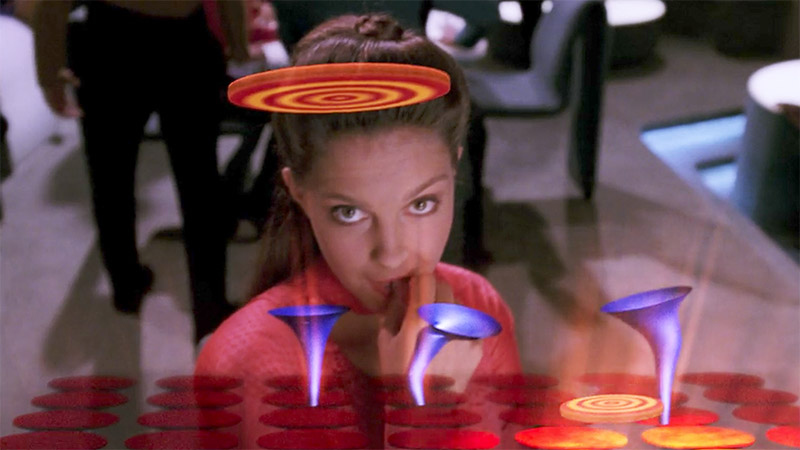
"The Game" (Star Trek: The Next Generation)
Aaron Harberts: In hindsight, I'm completely blown away with how brilliantly "The Game" captured where we are with screens in a modern society. It's so predictive about where we are and how we interface with our phones and entertainment. Plus, who doesn't love seeing Ashley Judd in one of her first TV performances!
Stream "The Game" now.
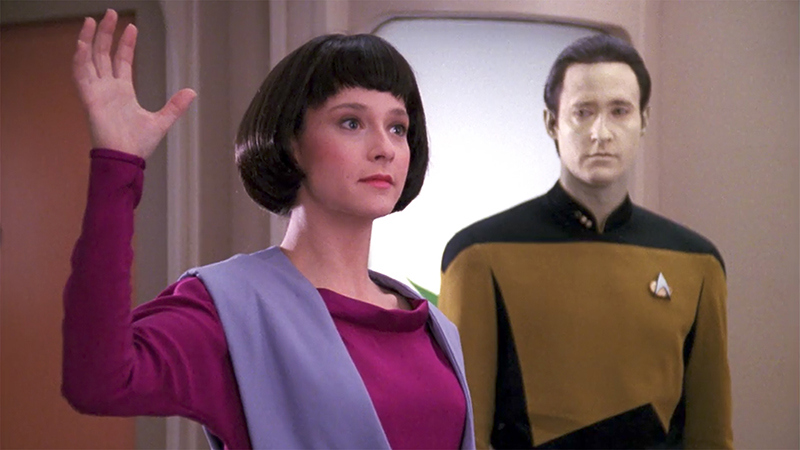
"The Offspring" (Star Trek: The Next Generation)
Lisa Randolph: This episode, in which Data creates his daughter Lal, stood out when I first watched it as a kid. Now as an adult and a parent, the story has taken on a deeper meaning and leaves me absolutely heartbroken.
Stream "The Offspring" now.
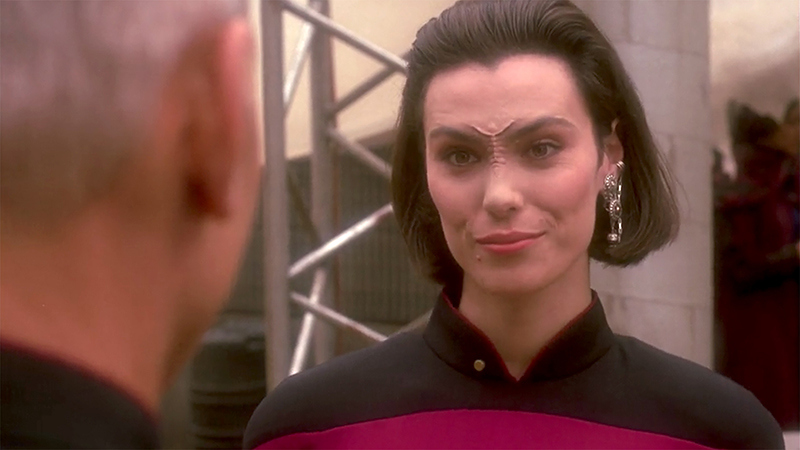
"Ensign Ro" (Star Trek: The Next Generation)
Lisa Randolph: Michelle Forbes steals the show as the titular Ensign Ro Laren. I am a huge fan of both the actress and the character, and the female camaraderie between Ro and Guinan in the episode was particularly layered and memorable.
Stream "Ensign Ro" now.
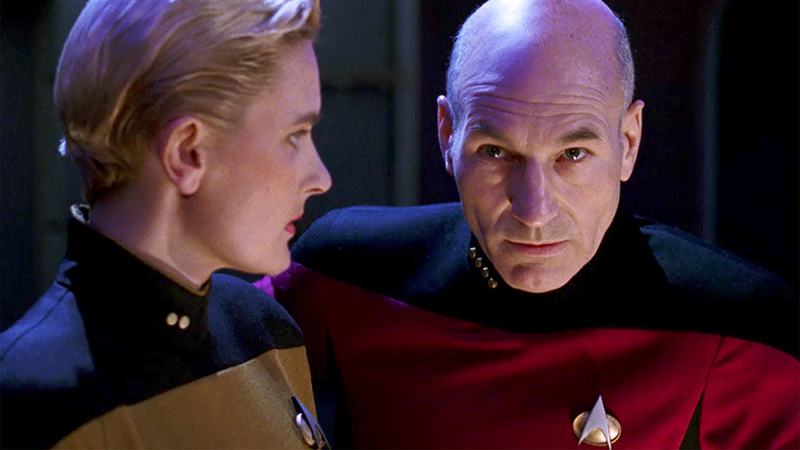
"Yesterday's Enterprise" (Star Trek: The Next Generation)
Jordon Nardino: A powerful episode to watch unfold, even if you already know what's going to happen. "Yesterday's Enterprise" doesn't just delight with a counterfactual, but enriches us with the story of good people hurtling towards a noble purpose. It is, to me, the most touching hour of television Trek has given us.
Stream "Yesterday's Enterprise" now.
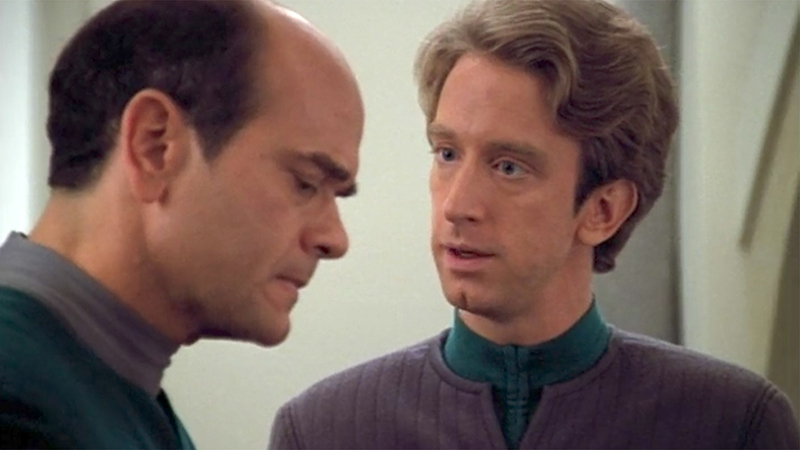
"Message in a Bottle" (Star Trek: Voyager)
Jordon Nardino: "Message in a Bottle" has something to say: Trek is fun. We get the curiosity of our Doctor thrown into a life-and-death situation, the delight of his friction, and then, cooperation, with his equivalent (Andy Dick) back home, and a touching payoff when Starfleet learns Voyager is not lost. Like the Doctor himself, this episode is fully functional.
Stream "Message in a Bottle" now.
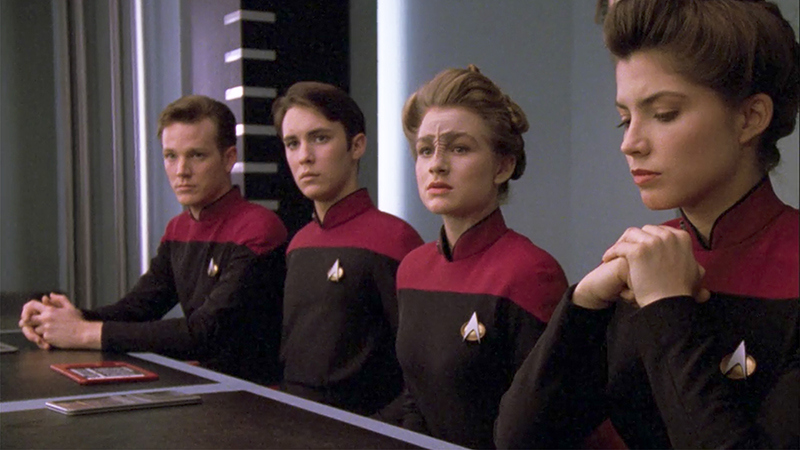
"The First Duty" (Star Trek: The Next Generation)
Jordon Nardino: Did you know this episode was screened for cadets at the United States Air Force Academy as an illustration of the honor code they were expected to serve? I did, because I read it on IMDB trivia. Wesley Crusher, you may have been at one time the kid we all wanted to eject into space, but you came back and showed us what being Starfleet was really all about.
Stream "The First Duty" now.
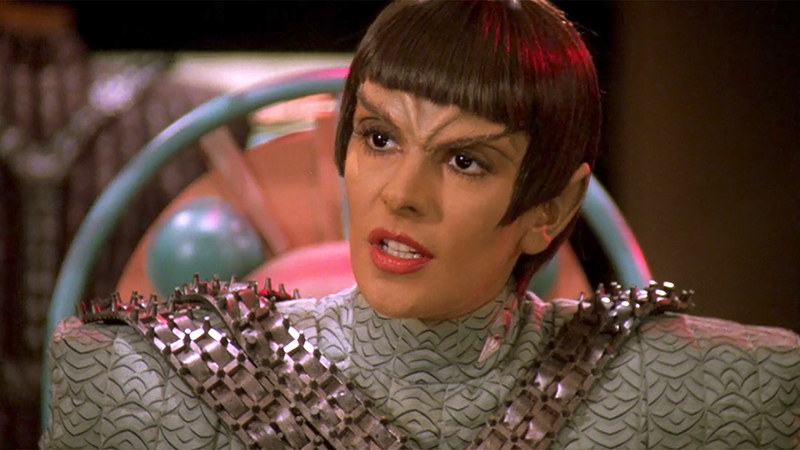
"Face of the Enemy" (Star Trek: The Next Generation)
Jordon Nardino: There are definitely better episodes of Trek to include on this list. But none that have give me so much pleasure as the moment Troi, in full Romulan drag, threatens to eject someone into space! Truly iconic. Your fave could never.
Stream "Face of the Enemy" now.
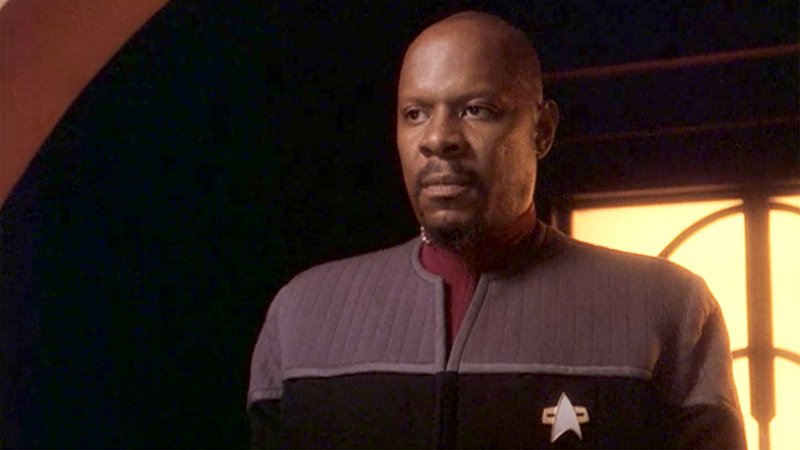
"Call to Arms" (Star Trek: Deep Space Nine)
Erika Lippoldt: A game-changing episode that revealed a whole new facet to a series five seasons in, and created a launching point for the brilliant Season 6 of DS9. Not only did this episode manage to heighten the stakes in an unexpected manner, it gave way to some of the juiciest character moments to date. When Sisko says "This has become my home, and you have become my family," the emotion behind those words is completely earned—and reminds us that even though the show was taking chances, it was still about family, as all Trek is.
Stream "Call to Arms" now.
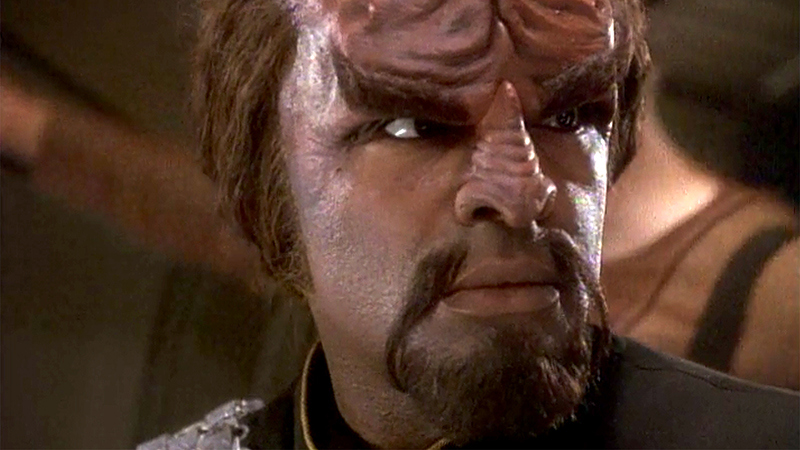
"The Way of the Warrior - Parts 1 & 2" (Star Trek: Deep Space Nine)
Erika Lippoldt: The reintroduction of a core TNG cast-member as a regular on another series could have felt cheap or forced—but fortunately for us, it turned out to be a wonderfully executed season premiere. The continued exploration of Worf's identity struggle between Klingon and Starfleet, his integration into the ensemble of this show—while doing them justice as well—and the cool action made for an extremely satisfying episode.
Stream "The Way of the Warrior" - Parts 1 & 2 now.
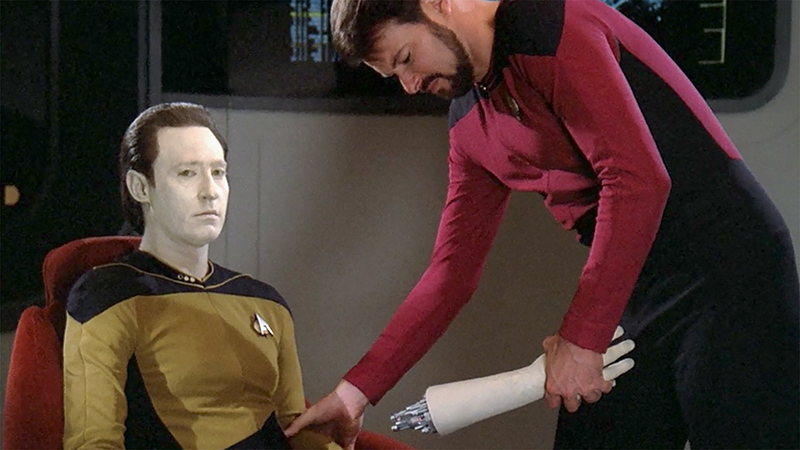
"The Measure of a Man" (Star Trek: The Next Generation)
Bo Yeon Kim: Only on Star Trek can a semi-bottle show, structured as the formal hearing of an android, turn out to be one of the most thought-provoking episodes (in the franchise, if not in science fiction television) that asks what it means to be human.
Stream "The Measure of a Man" now.
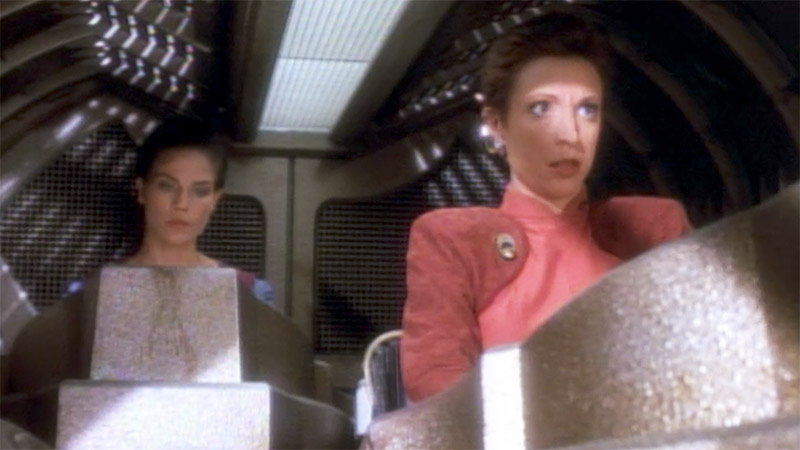
"The Siege" (Star Trek: Deep Space Nine)
Gretchen J. Berg: I love seeing how Kira and Dax get stranded and have to work together. They're not talking about boys, they're two strong women who are trying to fix a problem. They rely on their brains and skills. And it's one of the things I love most about Trek. And it's exciting to see that play out in our show with [Sonequa Martin-Green], [Michelle Yeoh], and [Mary Wiseman].
Stream "The Siege" now.
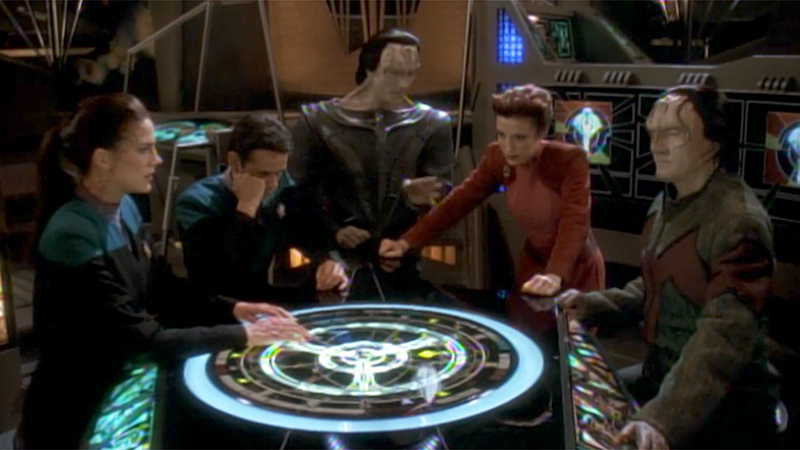
"Civil Defense" (Star Trek: Deep Space Nine)
Bo Yeon Kim: There's always that one episode where everything just "clicks" for you, the one that makes you realize when you're helplessly in love with a show. This was that episode for me with DS9. It had a wonderful balance of action and comedy, vaguely disguised as a bottle show (for which I have a great affinity), through which somehow every character was given an opportunity to shine. It also brilliantly utilized the space station and its notorious history as a Cardassian station, creating (quite literally) a ticking time bomb.
Stream "Civil Defense" now.
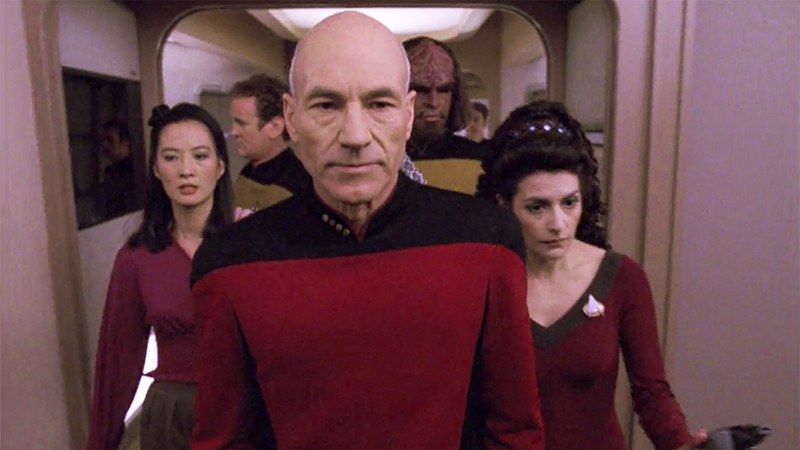
"Power Play" (Star Trek: The Next Generation)
Ted Sullivan: An absolutely riveting episode with spectacularly written twists that you don't see coming. The climax is simple: six people walking down a hallway... and it’s totally thrilling (helped by an amazing score by Jay Chattaway—one of my favorites in all of Trek). I have also always loved the O'Brien/Keiko dynamic, and it's front and center here in this "Die Hard in space" episode of TNG.
Stream "Power Play" now.
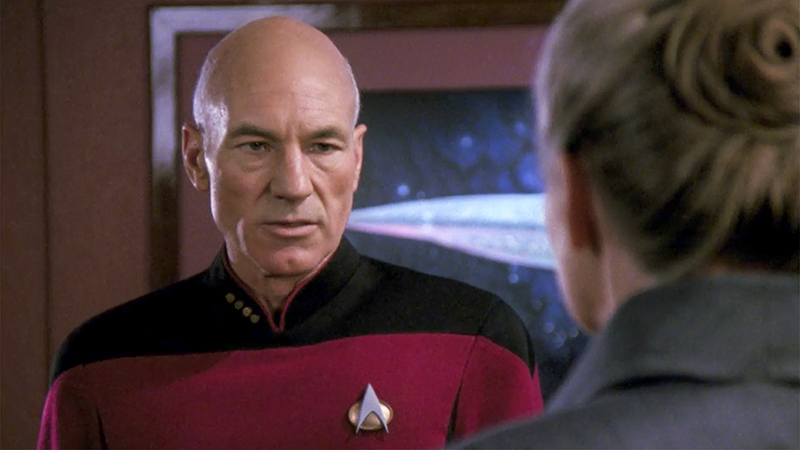
"Silicon Avatar" (Star Trek: The Next Generation)
Ted Sullivan: This episode had a huge impact on me when I first watched it. It deals with science, morality, and the definition of life itself. Is a shark evil if it eats a person? Or is it merely existing? I particularly loved the fact that this story has a tragic ending. (I find tragedy makes stronger points than happy endings.) Picard's adherence to the principles of Starfleet are beautifully illustrated here, which is what makes his elation at making first contact so powerful... and his devastation at the subsequent death so gut-wrenching.
Stream "Silicon Avatar" now.

"Trials and Tribble-ations" (Star Trek: Deep Space Nine)
Bo Yeon Kim: Time travel! Tribbles! Kirk! Spock! Tribbles! Jadzia Dax in a TOS red miniskirt! Tribbles! What more could you possibly want? Just a superbly, seamlessly executed homage to The Original Series, yet equally a quintessential DS9 story. And this episode includes one of my favorite writing "cheats" with Worf's line, in reference to the Klingons' lack of cranial ridges in TOS: "We do not discuss it with outsiders." F***ing brilliant.
Stream "Trials and Tribble-ations" now.
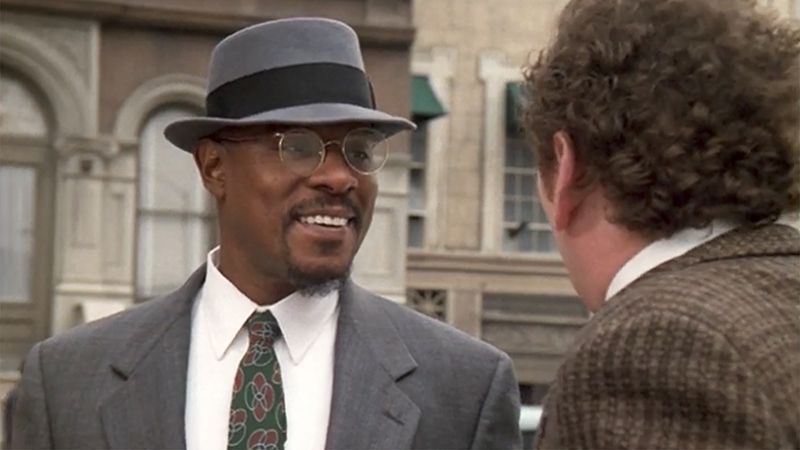
"Far Beyond the Stars" (Star Trek: Deep Space Nine)
Kirsten Beyer: Can't get enough of Benny Russell. "For all we know he's out there right now dreaming of us." It feels classic while being entirely meta. I love how it doesn't shy away from the implications of race in the period and the tragedy of Russell's ultimate fate.
Stream "Far Beyond the Stars" now.
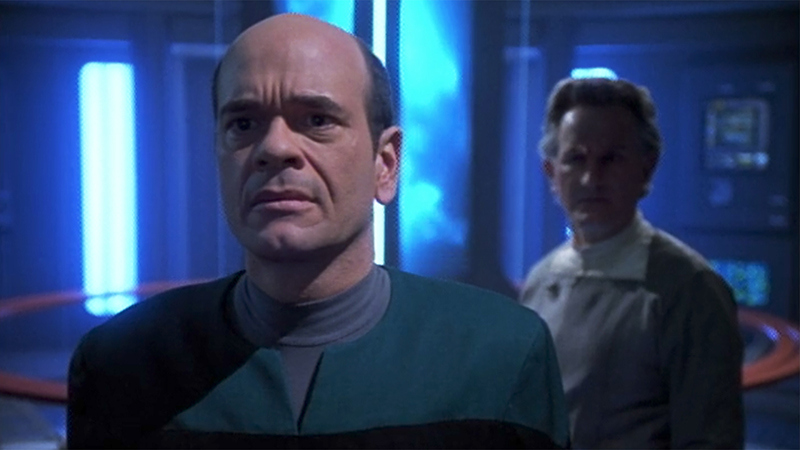
"Living Witness" (Star Trek: Voyager)
Kirsten Beyer: My personal favorite. Tim Russ's direction was fantastic. Picardo turned in a heart-breaking performance as the EMH left behind. For him, it was yesterday; for everyone else, hundreds of years had passed. Great premise—how does history remember us? And lots of campy fun for the rest of the cast.
Stream "Living Witness" now.
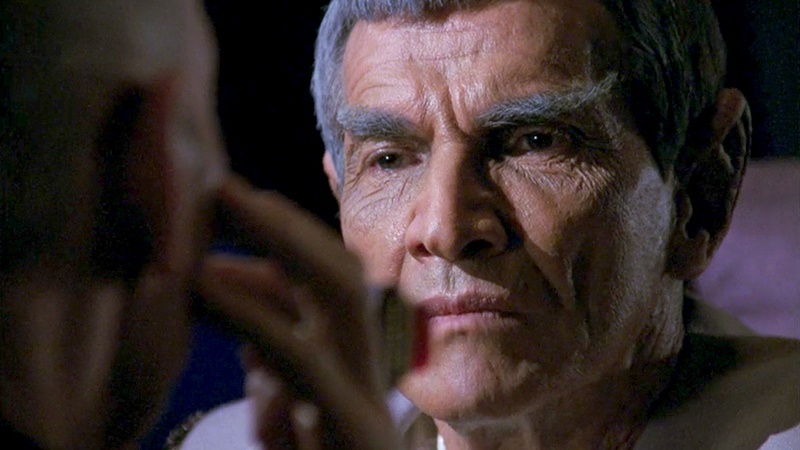
"Sarek" (Star Trek: The Next Generation)
Sean Cochran: I've always loved the character of Sarek, and this episode was probably one of the better Trek episodes dealing with emotion. Also touching on the experiences of growing old, to see Sarek shed a tear in the concert scene gets me every damn time.
Stream "Sarek" now.
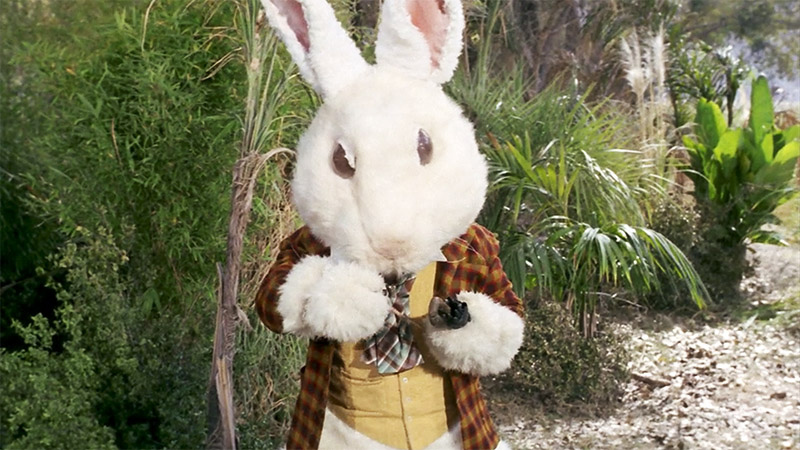
"Shore Leave" (Star Trek)
Aaron Harberts: It's fun, and plays with secondary characters like Sulu and McCoy. And it also has a giant rabbit in a vest. Only in Star Trek.
Stream "Shore Leave" now.
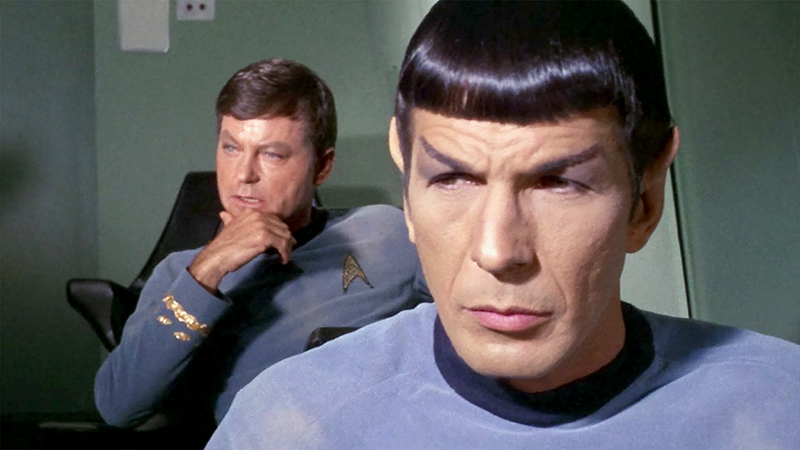
"The Galileo Seven" (Star Trek)
Erika Lippoldt: A great Spock/McCoy episode that hinged on what is now a staple of classic Star Trek—the half-human, half-Vulcan's struggle between logic and emotion.
Stream "The Galileo Seven" now.
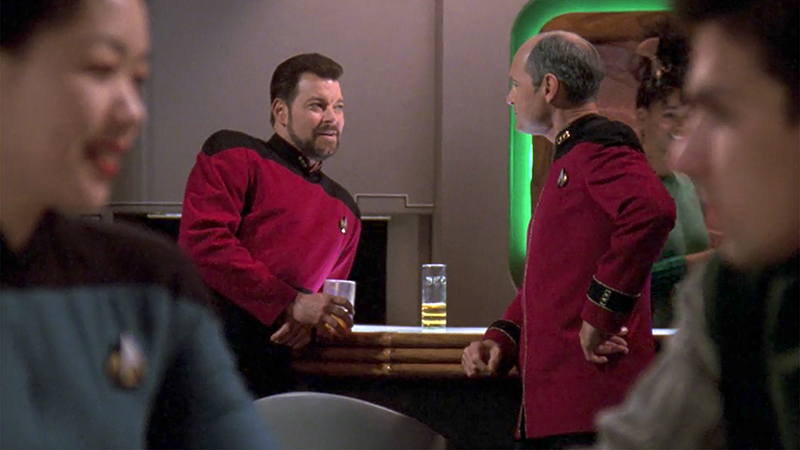
"The Pegasus" (Star Trek: The Next Generation)
Erika Lippoldt: The fun of a long-running series is often found in giving new insight into characters the audience has come to feel they know, and showing how the characters have grown since they were introduced. This episode does just that—Riker finds himself reunited with his former captain (giving depth to his backstory) and is confronted with a mission that tests his loyalties and poses a moral dilemma—complete with a science mystery. All the makings of a great episode of Trek.
Stream "The Pegasus" now.
Stream the entire first season of Star Trek: Discovery, exclusively on CBS All Access.
STREAM: Full Episodes Of Star Trek: Discovery On CBS All Access
With the new show now underway, Star Trek: Discovery Executive Producers Alex Kurtzman, Akiva Goldsman, Gretchen J. Berg, and Aaron Harberts, as well as writers Ted Sullivan, Lisa Randolph, Jordon Nardino, Erika Lippoldt, Bo Yeon Kim, Kirsten Beyer, and Sean Cochran have revealed some of their absolute favorite classic Trek episodes—or "Trekisodes"—and what they mean to them as both fans and creators.
Scroll down to see the team's top picks!

"Space Seed" (Star Trek)
Alex Kurtzman: A villain with a legitimately compelling reason "why" is rare currency and just about the hardest thing to accomplish. And so it began with Khan, whose motives are drawn by what's essentially a Spartacus story: Bred a slave, he rose against his less "superior" masters to declare his freedom—a freedom he conflates with totalitarianism, firmly landing him a prime place in the pantheon of all-time greatest badasses. Decades later, with [Star Trek II: The Wrath of Khan], the brilliant Nick Meyer built on Khan in what for me and many others became the best Trek movie of all time, which could never have existed if it weren't for this episode of TOS.
Stream "Space Seed" now.

"The Menagerie - Parts 1 & 2" (Star Trek)
Akiva Goldsman: Sacrilegious as it sounds, I prefer this two-parter to "The Cage." It has almost all the benefits of the original—Jeffrey Hunter as Pike, a literally cool Majel Barrett as Number One, emotional Spock, excellent sci-fi, and awesome scope and scale—but all this is actually made better by its re-contextualization into the series proper. Spock's devotion to Pike years later, its juxtaposition to his relationship with Kirk, and its clever reintegration of the original material make for a deeper and more utopian Trek story. Bonus Elements: The only death penalty left on the books and a phaser cannon.
Stream "The Menagerie - Parts 1 & 2" now.

"The Devil in the Dark" (Star Trek)
Gretchen J. Berg: The first time I watched it I burst into tears. I was so affected by the Horta and the twist. The way that Spock is able to see the Horta and then communicate with it and find out that this monster might not be a monster after all is such a profound piece of storytelling.
Kirsten Beyer: The whole "the monster was actually a mother protecting her babies" thing made quite an impact on me as a kid watching Trek for the first time.
Stream "The Devil in the Dark" now.

"The Inner Light" (Star Trek: The Next Generation)
Aaron Harberts: Patrick Stewart gives a stunning performance and it breaks the mold for traditional storytelling within Star Trek. It's bold and emotionally complex. It also had a lasting impact on Picard, which is an element of serialized storytelling that we're looking to build upon on our show.
Bo Yeon Kim: I was blown away by this beautiful (and gut-wrenching) first contact story that intricately weaves science fiction, mystery, and drama together into... well, a Ressikan flute solo. A masterclass in how to execute a high sci-fi concept via a grounded, emotional tale about family, life, and death.
Stream "The Inner Light" now.

"Darmok" (Star Trek: The Next Generation)
Gretchen J. Berg: It's written by our own Joe Menosky. It's everything great about Star Trek. It's one of the best Prime Directive stories ever told. And it's about understanding "the other"—which is a lesson we can all re-learn these days. And something we have baked into the DNA of our show as well.
Ted Sullivan: Even before I had the honor of writing Star Trek: Discovery with Joe Menosky, I was in awe of his writing. This episode is one of the smartest episodes of science fiction ever created. It's a beautiful exploration of two cultures seeking to find common ground. To communicate. To grow. And that journey comes with great sacrifice. Patrick Stewart and Paul Winfield give jaw-dropping performances as they slowly move their two cultures toward mutual understanding.
This episode is compelling from start to finish, but does not rely on phaser shootouts or space battles. Instead, it does what Star Trek does best: it's about sharing ideas and expanding our understanding of each other.
Kirsten Beyer: The concept of basing a language on metaphor remains stunning to this day, and the simple story of these two beings trying to communicate is the essence of Trek.
Sean Cochran: Beyond the involvement of the brilliant Joe Menosky, who wrote it, and the legendary Paul Winfield, who turned in one of the all-time Trek performances, I love how this episode highlights the lengths to which we must sometimes go to find common understanding with those dissimilar to us. That tragedy and loss are often central to cultural breakthroughs is something often found throughout history but rarely emphasized.
Stream "Darmok" now.

"Unification - Parts 1 & 2" (Star Trek: The Next Generation)
Alex Kurtzman: I watched this two-parter a lot for inspiration when we were writing the 2009 [Star Trek movie]. It helped me understand how to return Spock to the fold with the meaning and coronation one would expect from the great Vulcan's homecoming, but also pointed us toward the potential for a scene between elder and younger Spock.
The inspiration came from the scene between Spock and Data, a Trekker's dream come true, and I can only imagine the challenge [Michael Piller and Rick Berman] felt in tackling it. They executed [their relationship] perfectly by echoing them as opposite sides of the same coin: an android who yearns to become more human, and a Vulcan who's spent his elder years suppressing his human side. (Maybe it's just how I read into it, but it always felt like the absence of Kirk's friendship in Spock's life played into that.)
A deeply emotional scene held in restraint, it's a portrait of two beings both fascinated and confused by their similarities and differences, and reaching for understanding. That sums up what Trek is all about and gives poignant double meaning to the title "Unification."
Stream "Unification - Parts 1 & 2" now.

"The Changeling" (Star Trek)
Ted Sullivan: A cool metaphysical mystery that explores what life is and what consciousness means—classic Trek. But like "The Naked Time" and "Shore Leave," this episode also gives the supporting cast a chance to step into the spotlight. I love seeing more of Uhura's love for singing and hearing her speak Swahili (a terrific reminder that Trek could be something other than American-centric). I also really like seeing Uhura and Nurse Chapel bond as friends.
Stream "The Changeling" now.

"The City on the Edge of Forever" (Star Trek)
Akiva Goldsman: So many people's favorite Trek episode, including mine. Brilliant Harlan Ellison screenplay, made better by Roddenberry and company. Thought provoking sci-fi, and strong period work. Some of my favorite Trek elements: a return to earth, Starfleet revealed to civilians, naturalistic acting—all wrapped up inside a profound emotional punch. If streaming were available then, Kirk's loss of Edith Keeler would have taken him seasons to get over. Crazed Dr. McCoy and self-critical Spock, awesome bonus elements.
Ted Sullivan: Probably the safest choice a fan could ever make, but for good reason. Harlan Ellison created a morality tale that was complex, emotionally rich, and profoundly enlightening. He used all the pieces on the Trek chessboard like a grandmaster.
It was the first episode I ever saw (way back in the Dark Ages of 1979). As a young boy, I was confused by what I was watching. It was a science-fiction show set in the future, but the action took place in the past. The handsome hero did not save the beautiful woman (like Mighty Mouse or Superman always did). And the ending made me very sad, even though I also understood it was the right thing to do. It instantly opened my young eyes to not only a different kind of storytelling, but a different way of thinking about life and the choices we make. I credit this episode with shaping my morality more than any single other story.
Lisa Randolph: Joan Collins co-stars in the closest thing we'll ever get to Douglas Sirk directing Star Trek. Illustrating the tragedy of personal sacrifice for the greater good is Trek at its best and most poignant.
Sean Cochran: The Led Zeppelin of Trek episodes, some people might hear this as a favorite, moan, and then ask for a more interesting answer. But despite this, Led Zeppelin is still one of my favorite bands, and this is still one of my favorite episodes. Quintessential Trek in every possible way, it underscores how difficult a moral choice can be and complicates it even more by asking Kirk to consider the future—that which he has not yet seen—over the happiness and experiences of his present.
Stream "City on the Edge of Forever" now.

"The Game" (Star Trek: The Next Generation)
Aaron Harberts: In hindsight, I'm completely blown away with how brilliantly "The Game" captured where we are with screens in a modern society. It's so predictive about where we are and how we interface with our phones and entertainment. Plus, who doesn't love seeing Ashley Judd in one of her first TV performances!
Stream "The Game" now.

"The Offspring" (Star Trek: The Next Generation)
Lisa Randolph: This episode, in which Data creates his daughter Lal, stood out when I first watched it as a kid. Now as an adult and a parent, the story has taken on a deeper meaning and leaves me absolutely heartbroken.
Stream "The Offspring" now.

"Ensign Ro" (Star Trek: The Next Generation)
Lisa Randolph: Michelle Forbes steals the show as the titular Ensign Ro Laren. I am a huge fan of both the actress and the character, and the female camaraderie between Ro and Guinan in the episode was particularly layered and memorable.
Stream "Ensign Ro" now.

"Yesterday's Enterprise" (Star Trek: The Next Generation)
Jordon Nardino: A powerful episode to watch unfold, even if you already know what's going to happen. "Yesterday's Enterprise" doesn't just delight with a counterfactual, but enriches us with the story of good people hurtling towards a noble purpose. It is, to me, the most touching hour of television Trek has given us.
Stream "Yesterday's Enterprise" now.

"Message in a Bottle" (Star Trek: Voyager)
Jordon Nardino: "Message in a Bottle" has something to say: Trek is fun. We get the curiosity of our Doctor thrown into a life-and-death situation, the delight of his friction, and then, cooperation, with his equivalent (Andy Dick) back home, and a touching payoff when Starfleet learns Voyager is not lost. Like the Doctor himself, this episode is fully functional.
Stream "Message in a Bottle" now.

"The First Duty" (Star Trek: The Next Generation)
Jordon Nardino: Did you know this episode was screened for cadets at the United States Air Force Academy as an illustration of the honor code they were expected to serve? I did, because I read it on IMDB trivia. Wesley Crusher, you may have been at one time the kid we all wanted to eject into space, but you came back and showed us what being Starfleet was really all about.
Stream "The First Duty" now.

"Face of the Enemy" (Star Trek: The Next Generation)
Jordon Nardino: There are definitely better episodes of Trek to include on this list. But none that have give me so much pleasure as the moment Troi, in full Romulan drag, threatens to eject someone into space! Truly iconic. Your fave could never.
Stream "Face of the Enemy" now.

"Call to Arms" (Star Trek: Deep Space Nine)
Erika Lippoldt: A game-changing episode that revealed a whole new facet to a series five seasons in, and created a launching point for the brilliant Season 6 of DS9. Not only did this episode manage to heighten the stakes in an unexpected manner, it gave way to some of the juiciest character moments to date. When Sisko says "This has become my home, and you have become my family," the emotion behind those words is completely earned—and reminds us that even though the show was taking chances, it was still about family, as all Trek is.
Stream "Call to Arms" now.

"The Way of the Warrior - Parts 1 & 2" (Star Trek: Deep Space Nine)
Erika Lippoldt: The reintroduction of a core TNG cast-member as a regular on another series could have felt cheap or forced—but fortunately for us, it turned out to be a wonderfully executed season premiere. The continued exploration of Worf's identity struggle between Klingon and Starfleet, his integration into the ensemble of this show—while doing them justice as well—and the cool action made for an extremely satisfying episode.
Stream "The Way of the Warrior" - Parts 1 & 2 now.

"The Measure of a Man" (Star Trek: The Next Generation)
Bo Yeon Kim: Only on Star Trek can a semi-bottle show, structured as the formal hearing of an android, turn out to be one of the most thought-provoking episodes (in the franchise, if not in science fiction television) that asks what it means to be human.
Stream "The Measure of a Man" now.

"The Siege" (Star Trek: Deep Space Nine)
Gretchen J. Berg: I love seeing how Kira and Dax get stranded and have to work together. They're not talking about boys, they're two strong women who are trying to fix a problem. They rely on their brains and skills. And it's one of the things I love most about Trek. And it's exciting to see that play out in our show with [Sonequa Martin-Green], [Michelle Yeoh], and [Mary Wiseman].
Stream "The Siege" now.

"Civil Defense" (Star Trek: Deep Space Nine)
Bo Yeon Kim: There's always that one episode where everything just "clicks" for you, the one that makes you realize when you're helplessly in love with a show. This was that episode for me with DS9. It had a wonderful balance of action and comedy, vaguely disguised as a bottle show (for which I have a great affinity), through which somehow every character was given an opportunity to shine. It also brilliantly utilized the space station and its notorious history as a Cardassian station, creating (quite literally) a ticking time bomb.
Stream "Civil Defense" now.

"Power Play" (Star Trek: The Next Generation)
Ted Sullivan: An absolutely riveting episode with spectacularly written twists that you don't see coming. The climax is simple: six people walking down a hallway... and it’s totally thrilling (helped by an amazing score by Jay Chattaway—one of my favorites in all of Trek). I have also always loved the O'Brien/Keiko dynamic, and it's front and center here in this "Die Hard in space" episode of TNG.
Stream "Power Play" now.
"Silicon Avatar" (Star Trek: The Next Generation)
Ted Sullivan: This episode had a huge impact on me when I first watched it. It deals with science, morality, and the definition of life itself. Is a shark evil if it eats a person? Or is it merely existing? I particularly loved the fact that this story has a tragic ending. (I find tragedy makes stronger points than happy endings.) Picard's adherence to the principles of Starfleet are beautifully illustrated here, which is what makes his elation at making first contact so powerful... and his devastation at the subsequent death so gut-wrenching.
Stream "Silicon Avatar" now.

"Trials and Tribble-ations" (Star Trek: Deep Space Nine)
Bo Yeon Kim: Time travel! Tribbles! Kirk! Spock! Tribbles! Jadzia Dax in a TOS red miniskirt! Tribbles! What more could you possibly want? Just a superbly, seamlessly executed homage to The Original Series, yet equally a quintessential DS9 story. And this episode includes one of my favorite writing "cheats" with Worf's line, in reference to the Klingons' lack of cranial ridges in TOS: "We do not discuss it with outsiders." F***ing brilliant.
Stream "Trials and Tribble-ations" now.

"Far Beyond the Stars" (Star Trek: Deep Space Nine)
Kirsten Beyer: Can't get enough of Benny Russell. "For all we know he's out there right now dreaming of us." It feels classic while being entirely meta. I love how it doesn't shy away from the implications of race in the period and the tragedy of Russell's ultimate fate.
Stream "Far Beyond the Stars" now.

"Living Witness" (Star Trek: Voyager)
Kirsten Beyer: My personal favorite. Tim Russ's direction was fantastic. Picardo turned in a heart-breaking performance as the EMH left behind. For him, it was yesterday; for everyone else, hundreds of years had passed. Great premise—how does history remember us? And lots of campy fun for the rest of the cast.
Stream "Living Witness" now.

"Sarek" (Star Trek: The Next Generation)
Sean Cochran: I've always loved the character of Sarek, and this episode was probably one of the better Trek episodes dealing with emotion. Also touching on the experiences of growing old, to see Sarek shed a tear in the concert scene gets me every damn time.
Stream "Sarek" now.

"Shore Leave" (Star Trek)
Aaron Harberts: It's fun, and plays with secondary characters like Sulu and McCoy. And it also has a giant rabbit in a vest. Only in Star Trek.
Stream "Shore Leave" now.

"The Galileo Seven" (Star Trek)
Erika Lippoldt: A great Spock/McCoy episode that hinged on what is now a staple of classic Star Trek—the half-human, half-Vulcan's struggle between logic and emotion.
Stream "The Galileo Seven" now.

"The Pegasus" (Star Trek: The Next Generation)
Erika Lippoldt: The fun of a long-running series is often found in giving new insight into characters the audience has come to feel they know, and showing how the characters have grown since they were introduced. This episode does just that—Riker finds himself reunited with his former captain (giving depth to his backstory) and is confronted with a mission that tests his loyalties and poses a moral dilemma—complete with a science mystery. All the makings of a great episode of Trek.
Stream "The Pegasus" now.
Stream the entire first season of Star Trek: Discovery, exclusively on CBS All Access.
